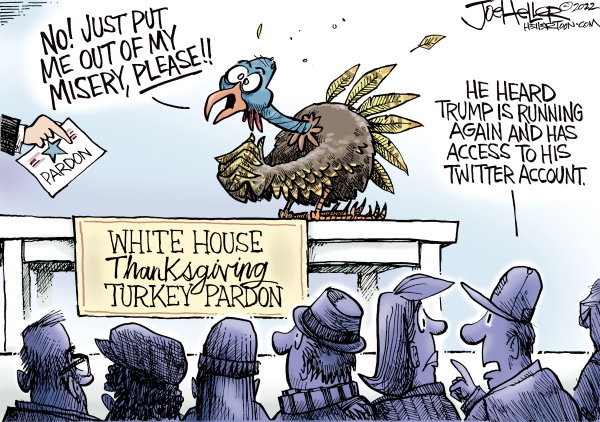 As early voting records are smashed and lines are obscenely long once again in advance of Tuesday's U.S. Senate Runoff Election Day, today's BradCast offers a maddening reminder of why we've been covering Georgia elections, in such detail, for so many years. [Audio link to full show follows this summary.]
As early voting records are smashed and lines are obscenely long once again in advance of Tuesday's U.S. Senate Runoff Election Day, today's BradCast offers a maddening reminder of why we've been covering Georgia elections, in such detail, for so many years. [Audio link to full show follows this summary.]
Thanks to state Republicans who cut the time for runoff elections by more than half after the 2020 elections, voters across the GA are now forced to wait in hours-long lines to vote early this week in the contest between incumbent Democratic Sen. Raphael Warnock and Trump-backed former football player and unapologetic liar Herschel Walker. While early voting records are being broken, as we detailed yesterday, much of that is thanks to the GOP's SB202 voter suppression bill [PDF], adopted last year by the state legislature, supported by its Republican Sec. of State Brad Raffensperger and signed by its Republican Governor Brian Kemp.
Where Peach State voters had as many as 17 early voting days in the November 8 elections, they now have no more than 7. And with the compressed time between the general and the runoff, few are able to request, receive and return absentee mail ballots in time. Instead, voters are now being forced to stand in line to vote at polling places on the state's 100% unverifiable touchscreen computer voting systems.
We're joined today to discuss that and much more by longtime election integrity champion JEANNE DUFORT of the Coalition for Good Governance. Dufort has served as Georgia election observer for many years, representing both the Democratic and Libertarian Parties at various times in the Peach State's rural, Republican-leaning Morgan County. She is also a named plaintiff (Full Disclosure: Along with me!) in the Coalition's lawsuit challenging several of the many disturbing provisions of SB202.
Dufort offers insight today from on the ground on how things went for voters on November 8, with most of SB202's voting restrictions in place; why it's now so difficult to vote there once again in the runoff; and why voters should be concerned about the ability to know if results reported next week by Raffensperger's insecure and unverifiable touchscreen systems --- forced on voters at every polling place, instead of verifiable hand-marked paper ballots! --- will actually reflect the intent of state voters.
"You can break all the daily [early voting] records that you want and still not have enough capacity for everybody who wants to vote," she explains. "All of the bottlenecks are at check-in. They haven't been able to figure out how to get enough check-in stations to get 17 days-worth of early voting, plus people who would prefer to vote by mail but don't think they can" into the short early voting period now allotted by SB202. "Compressing all that into these seven days is ten pounds in a five pound sack."
In addition to check-in bottlenecks, the computerized voting systems don't make any of it easier or faster, particularly in an election with one single race on most ballots across the state. "It would be faster if they handed them a ballot and just marked it. That would be faster than putting the card into the machine, bringing it up, tabbing through the things, do the check and waiting for the printer. It's just stupid. When you think about marking a ballot by a pen and then watch the process on a machine, it seems amazing that somebody would spend $3,000 on a machine to do what a $1 pen would do. But here we are."
As usual, there is much much more to discuss with Dufort about all of this today!
Also on today's program...
- "Dems in array!" In a rare display of unity on the left, House Democrats voted unanimously on Wednesday for their new leadership beginning in January. New York's Rep. Hakeem Jeffries will be the first black American to head up a major political party in Congress, taking the reigns following Nancy Pelosi's historic tenure as she and the rest of the party's longtime leadership team step aside to allow a new, younger generation to take over. All of that by way of contrast with the chaos on the GOP side and whether Rep. Kevin McCarthy will be able to muster enough votes from his own caucus to become the new Republican House Speaker next year.
- With Pelosi still serving as Speaker in the lame duck session of Congress, the House passed two bills today to try and help avert a rail strike that would cripple the nation's economy. With 4 of 12 rail unions opposing a new contract negotiated with the help of the White House in September --- granting a 24% pay raise to workers, but failing to allow for paid sick days --- a bipartisan bill would force the agreement to be adopted. A second bill passed by all Democrats and only three Republicans in the House on Wednesday would mandate seven paid sick days per year. Whether either measure can now be passed in the Senate, where approval by 10 Republicans would be needed to overcome a filibuster, remains to be seen.
- And, in a unanimous three-paragraph ruling late Tuesday, the South Carolina Supreme Court ordered Trump's last Chief of Staff, Mark Meadows, to testify before the Special Grand Jury in Atlanta convened by Fulton County District Attorney Fani Willis to probe the Trump-lead conspiracy to strong-arm GA election officials into changing the 2020 results in his favor. Meadows argued he didn't have to testify due to executive privilege. SC's Supreme Court tersely responded in their order: "We have reviewed the arguments raised by [Meadows] and find them to be manifestly without merit." Ouch...
(Snail mail support to "Brad Friedman, 7095 Hollywood Blvd., #594 Los Angeles, CA 90028" always welcome too!)
|


 How (and Why!) to 'Extend an Olive Branch' to MAGA Family Members Over the Holidays: 'BradCast' 11/21/24
How (and Why!) to 'Extend an Olive Branch' to MAGA Family Members Over the Holidays: 'BradCast' 11/21/24 'Green News Report' 11/21/24
'Green News Report' 11/21/24
 Former Federal Prosecutor: Trump Must Be Sentenced in NY Before Taking Office Again: 'BradCast' 11/20/24
Former Federal Prosecutor: Trump Must Be Sentenced in NY Before Taking Office Again: 'BradCast' 11/20/24 'Bullet Ballot' Claims, Other Arguments for Hand-Counting 2024 Battleground Votes: 'BradCast' 11/19/24
'Bullet Ballot' Claims, Other Arguments for Hand-Counting 2024 Battleground Votes: 'BradCast' 11/19/24 'Green News Report' 11/19/24
'Green News Report' 11/19/24 Trump Already Violating Law (He Signed!) During Transition: 'BradCast' 11/18/24
Trump Already Violating Law (He Signed!) During Transition: 'BradCast' 11/18/24 Sunday 'Into the Gaetz of Hell' Toons
Sunday 'Into the Gaetz of Hell' Toons Computer Security Experts Ask Harris to Seek Hand-Counts Due to Voting System Breaches: 'BradCast' 11/14/24
Computer Security Experts Ask Harris to Seek Hand-Counts Due to Voting System Breaches: 'BradCast' 11/14/24  'Green News Report' 11/14/24
'Green News Report' 11/14/24 Trump Criminal Cases Fade After Election as GOP 'Does Not Believe in Rule of Law': 'BradCast' 11/13/24
Trump Criminal Cases Fade After Election as GOP 'Does Not Believe in Rule of Law': 'BradCast' 11/13/24 Climate Advocates Brace for Fight With Trump 2.0: 'BradCast' 11/12/24
Climate Advocates Brace for Fight With Trump 2.0: 'BradCast' 11/12/24 'Green News Report' 11/12/24
'Green News Report' 11/12/24 Let It All Out: 'BradCast' 11/11/24
Let It All Out: 'BradCast' 11/11/24 Sunday 'Like it or Not' Toons
Sunday 'Like it or Not' Toons Not All Bad: Abortion Rights Won Big (Almost) Everywhere: 'BradCast' 11/7/24
Not All Bad: Abortion Rights Won Big (Almost) Everywhere: 'BradCast' 11/7/24 'Green News Report' 11/7/24
'Green News Report' 11/7/24 U.S. CHOOSES CONVICTED CRIMINAL, ADJUDICATED RAPIST: 'BradCast' 11/6/24
U.S. CHOOSES CONVICTED CRIMINAL, ADJUDICATED RAPIST: 'BradCast' 11/6/24 ELECTION DAY 2024: Tea Leaves, Probs for Voters, What's Next: 'BradCast' 11/5/24
ELECTION DAY 2024: Tea Leaves, Probs for Voters, What's Next: 'BradCast' 11/5/24 'Closing Arguments' for Undecideds, Third-Party Voters: 'BradCast' 11/4/24
'Closing Arguments' for Undecideds, Third-Party Voters: 'BradCast' 11/4/24 The GOP 'Voter Fraud' Before the Storm: 'BradCast' 10/31/24
The GOP 'Voter Fraud' Before the Storm: 'BradCast' 10/31/24 'Closing Arguments'with Digby and Driftglass: 'BradCast' 10/30/24
'Closing Arguments'with Digby and Driftglass: 'BradCast' 10/30/24 Trump Promises to be a Lawless, Authoritarian President. Believe Him: 'BradCast' 10/29/24
Trump Promises to be a Lawless, Authoritarian President. Believe Him: 'BradCast' 10/29/24 Ballots Burn, Billion-aires 'Obey in Advance', Callers Ring In: 'BradCast' 10/28/24
Ballots Burn, Billion-aires 'Obey in Advance', Callers Ring In: 'BradCast' 10/28/24 Musk's Privatized Internet Satellite System Threatens U.S. National Security
Musk's Privatized Internet Satellite System Threatens U.S. National Security
 VA GOP VOTER REG FRAUDSTER OFF HOOK
VA GOP VOTER REG FRAUDSTER OFF HOOK Criminal GOP Voter Registration Fraud Probe Expanding in VA
Criminal GOP Voter Registration Fraud Probe Expanding in VA DOJ PROBE SOUGHT AFTER VA ARREST
DOJ PROBE SOUGHT AFTER VA ARREST Arrest in VA: GOP Voter Reg Scandal Widens
Arrest in VA: GOP Voter Reg Scandal Widens ALL TOGETHER: ROVE, SPROUL, KOCHS, RNC
ALL TOGETHER: ROVE, SPROUL, KOCHS, RNC LATimes: RNC's 'Fired' Sproul Working for Repubs in 'as Many as 30 States'
LATimes: RNC's 'Fired' Sproul Working for Repubs in 'as Many as 30 States' 'Fired' Sproul Group 'Cloned', Still Working for Republicans in At Least 10 States
'Fired' Sproul Group 'Cloned', Still Working for Republicans in At Least 10 States FINALLY: FOX ON GOP REG FRAUD SCANDAL
FINALLY: FOX ON GOP REG FRAUD SCANDAL COLORADO FOLLOWS FLORIDA WITH GOP CRIMINAL INVESTIGATION
COLORADO FOLLOWS FLORIDA WITH GOP CRIMINAL INVESTIGATION CRIMINAL PROBE LAUNCHED INTO GOP VOTER REGISTRATION FRAUD SCANDAL IN FL
CRIMINAL PROBE LAUNCHED INTO GOP VOTER REGISTRATION FRAUD SCANDAL IN FL Brad Breaks PA Photo ID & GOP Registration Fraud Scandal News on Hartmann TV
Brad Breaks PA Photo ID & GOP Registration Fraud Scandal News on Hartmann TV  CAUGHT ON TAPE: COORDINATED NATIONWIDE GOP VOTER REG SCAM
CAUGHT ON TAPE: COORDINATED NATIONWIDE GOP VOTER REG SCAM CRIMINAL ELECTION FRAUD COMPLAINT FILED AGAINST GOP 'FRAUD' FIRM
CRIMINAL ELECTION FRAUD COMPLAINT FILED AGAINST GOP 'FRAUD' FIRM RICK SCOTT GETS ROLLED IN GOP REGISTRATION FRAUD SCANDAL
RICK SCOTT GETS ROLLED IN GOP REGISTRATION FRAUD SCANDAL VIDEO: Brad Breaks GOP Reg Fraud Scandal on Hartmann TV
VIDEO: Brad Breaks GOP Reg Fraud Scandal on Hartmann TV RNC FIRES NATIONAL VOTER REGISTRATION FIRM FOR FRAUD
RNC FIRES NATIONAL VOTER REGISTRATION FIRM FOR FRAUD EXCLUSIVE: Intvw w/ FL Official Who First Discovered GOP Reg Fraud
EXCLUSIVE: Intvw w/ FL Official Who First Discovered GOP Reg Fraud GOP REGISTRATION FRAUD FOUND IN FL
GOP REGISTRATION FRAUD FOUND IN FL



















 It's another crazy day in MAGA Land on today's
It's another crazy day in MAGA Land on today's 







 We're back for today's
We're back for today's 

 It's our last
It's our last 
 There are just too many crimes. Next time we'll need to plan a longer
There are just too many crimes. Next time we'll need to plan a longer 
 It may be a somewhat disconcerting deja vu on today's
It may be a somewhat disconcerting deja vu on today's  "Election Day" coverage continues today into its second week on
"Election Day" coverage continues today into its second week on 
 Welp, Election 2022 continues into its second week of counting on today's
Welp, Election 2022 continues into its second week of counting on today's 














